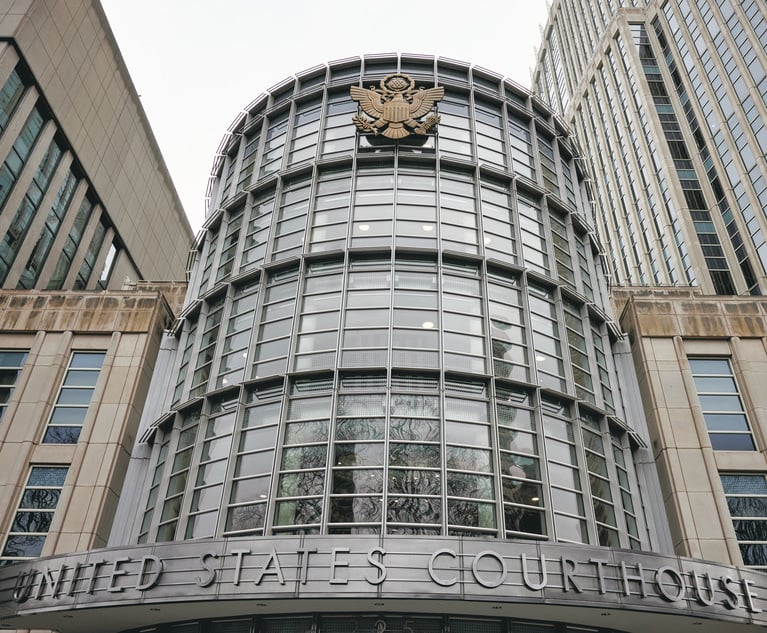Education Advocacy Group Sues DeVos Over Student Loan Protection Rule
The suit aims to invalidate a new rule that would impose new requirements and procedural hurdles for students looking to cancel fraudulent loan obligations.
February 19, 2020 at 05:29 PM
4 minute read
 U.S. Department of Education Secretary Betsy DeVos. (Photo: Gage Skidmore via Wikimedia Commons)
U.S. Department of Education Secretary Betsy DeVos. (Photo: Gage Skidmore via Wikimedia Commons)
A New York public interest group on Wednesday sued U.S. Education Secretary Betsy DeVos in Manhattan federal court over a new rule that rolls back Obama-era protections for students who claim they were defrauded by colleges or universities.
The lawsuit, filed by the Project on Predatory Student Lending and Public Citizen Litigation Group on behalf of the New York Legal Assistance Group, aims to invalidate borrower defense regulations that would impose new requirements and procedural hurdles for students looking to cancel fraudulent loan obligations.
According to the filing, the Department of Education did not take public comment on its planned changes, which NYLAG said would implement a new standard and make it "nearly impossible" for students to obtain loan forgiveness.
The new rule, set to take hold in July, also would shorten the statute of limitations for students to assert borrower defenses and eliminate their ability to pursue claims as a group when the schools they attended engaged in misconduct or suddenly closed. Among other things, it would establish an "extremely burdensome" application process and impose a tougher standard for relief that requires borrowers to submit more evidence.
The Education Department has pointed to a large number of past claims that it says were unsubstantiated as justification for the changes.
On Wednesday, a spokeswoman said "the department will vigorously defend its regulation, which gives students and borrowers the relief that they're owed, restores fairness and due process, extends the period for closed school discharges, and saves the taxpayers up to $11.1 billion over 10 years."
The Obama administration in 2016 overhauled rules protecting taxpayers and borrowers after a 2012 Senate committee report detailed predatory lending practices by for-profit colleges that misled prospective students about program costs and their options for federal financial assistance.
DeVos, starting in 2017, tried three times to block the rules from going into effect while the Education Department crafted new regulations. However, a federal judge later ruled those delays unlawful and ordered that the 2016 rules go into effect.
According to NYLAG's lawsuit, the resulting rule-making process under DeVos treated the Obama-era regulations as though they were no longer in effect and improperly shielded the rules from public comment procedures that are required by law.
"This devastating rule goes above and beyond the department's other significant efforts to deny defrauded students loan relief," Toby Merrill, director of the Project on Predatory Student Lending, said in a statement. "It imposes impossible standards for defrauded students seeking to assert their legal rights to loan cancellation, and relies on explanations that defy logic and rest on no evidence. There is no question this rule is illegal and will not stand up in court."
NYLAG, which offers services, including free legal counseling, to low income New Yorkers called the changes "arbitrary and capricious" and said it would be forced to divert additional time and resources to helping students navigate the administrative claims process.
"If allowed to go into effect, this rule not only would harm thousands of student loan borrowers with low income in New York and across the country, but also put a drain on the resources of NYLAG and other organizations that assist borrowers in seeking the relief they are entitled to," said Jane Greengold Stevens, co-director of NYLAG's Special Litigation Unit. "By issuing this rule, Secretary DeVos is helping for-profit schools evade responsibility and putting even more of a burden on students facing crushing debt."
NYLAG is represented in the suit by Adam Pulver and Adina Rosenbaum of the Public Citizen Litigation Group and Eileen Connor, Toby Merrill and Michael Turri of the Project on Predatory Student Lending.
An online docket-tracking service did not list counsel for Devos and the Education Department on Wednesday.
The case, captioned New York Legal Assistance Group v. DeVos, has not yet been assigned to a judge.
Read More:
Students Defrauded by For-Profit College Sue US Education Department
Here's What You Need to Know About the Changing Title IX Guidelines
Suits Against Harvard and NYU Law Reviews Claim Racial, Gender Preferences
This content has been archived. It is available through our partners, LexisNexis® and Bloomberg Law.
To view this content, please continue to their sites.
Not a Lexis Subscriber?
Subscribe Now
Not a Bloomberg Law Subscriber?
Subscribe Now
NOT FOR REPRINT
© 2025 ALM Global, LLC, All Rights Reserved. Request academic re-use from www.copyright.com. All other uses, submit a request to [email protected]. For more information visit Asset & Logo Licensing.
You Might Like
View All
The Met Hires GC of Elite University as Next Legal Chief

NY Appellate Panel Cites Student's Disciplinary History While Sending Negligence Claim Against School District to Trial

'No Evidence'?: Big Law Firms Defend Academic Publishers in EDNY Antitrust Case
3 minute read
'Substantive Deficiencies': Judge Grants Big Law Motion Dismissing Ivy League Price-Fixing Claims
3 minute readTrending Stories
- 1Uber Files RICO Suit Against Plaintiff-Side Firms Alleging Fraudulent Injury Claims
- 2The Law Firm Disrupted: Scrutinizing the Elephant More Than the Mouse
- 3Inherent Diminished Value Damages Unavailable to 3rd-Party Claimants, Court Says
- 4Pa. Defense Firm Sued by Client Over Ex-Eagles Player's $43.5M Med Mal Win
- 5Losses Mount at Morris Manning, but Departing Ex-Chair Stays Bullish About His Old Firm's Future
Who Got The Work
J. Brugh Lower of Gibbons has entered an appearance for industrial equipment supplier Devco Corporation in a pending trademark infringement lawsuit. The suit, accusing the defendant of selling knock-off Graco products, was filed Dec. 18 in New Jersey District Court by Rivkin Radler on behalf of Graco Inc. and Graco Minnesota. The case, assigned to U.S. District Judge Zahid N. Quraishi, is 3:24-cv-11294, Graco Inc. et al v. Devco Corporation.
Who Got The Work
Rebecca Maller-Stein and Kent A. Yalowitz of Arnold & Porter Kaye Scholer have entered their appearances for Hanaco Venture Capital and its executives, Lior Prosor and David Frankel, in a pending securities lawsuit. The action, filed on Dec. 24 in New York Southern District Court by Zell, Aron & Co. on behalf of Goldeneye Advisors, accuses the defendants of negligently and fraudulently managing the plaintiff's $1 million investment. The case, assigned to U.S. District Judge Vernon S. Broderick, is 1:24-cv-09918, Goldeneye Advisors, LLC v. Hanaco Venture Capital, Ltd. et al.
Who Got The Work
Attorneys from A&O Shearman has stepped in as defense counsel for Toronto-Dominion Bank and other defendants in a pending securities class action. The suit, filed Dec. 11 in New York Southern District Court by Bleichmar Fonti & Auld, accuses the defendants of concealing the bank's 'pervasive' deficiencies in regards to its compliance with the Bank Secrecy Act and the quality of its anti-money laundering controls. The case, assigned to U.S. District Judge Arun Subramanian, is 1:24-cv-09445, Gonzalez v. The Toronto-Dominion Bank et al.
Who Got The Work
Crown Castle International, a Pennsylvania company providing shared communications infrastructure, has turned to Luke D. Wolf of Gordon Rees Scully Mansukhani to fend off a pending breach-of-contract lawsuit. The court action, filed Nov. 25 in Michigan Eastern District Court by Hooper Hathaway PC on behalf of The Town Residences LLC, accuses Crown Castle of failing to transfer approximately $30,000 in utility payments from T-Mobile in breach of a roof-top lease and assignment agreement. The case, assigned to U.S. District Judge Susan K. Declercq, is 2:24-cv-13131, The Town Residences LLC v. T-Mobile US, Inc. et al.
Who Got The Work
Wilfred P. Coronato and Daniel M. Schwartz of McCarter & English have stepped in as defense counsel to Electrolux Home Products Inc. in a pending product liability lawsuit. The court action, filed Nov. 26 in New York Eastern District Court by Poulos Lopiccolo PC and Nagel Rice LLP on behalf of David Stern, alleges that the defendant's refrigerators’ drawers and shelving repeatedly break and fall apart within months after purchase. The case, assigned to U.S. District Judge Joan M. Azrack, is 2:24-cv-08204, Stern v. Electrolux Home Products, Inc.
Featured Firms
Law Offices of Gary Martin Hays & Associates, P.C.
(470) 294-1674
Law Offices of Mark E. Salomone
(857) 444-6468
Smith & Hassler
(713) 739-1250






